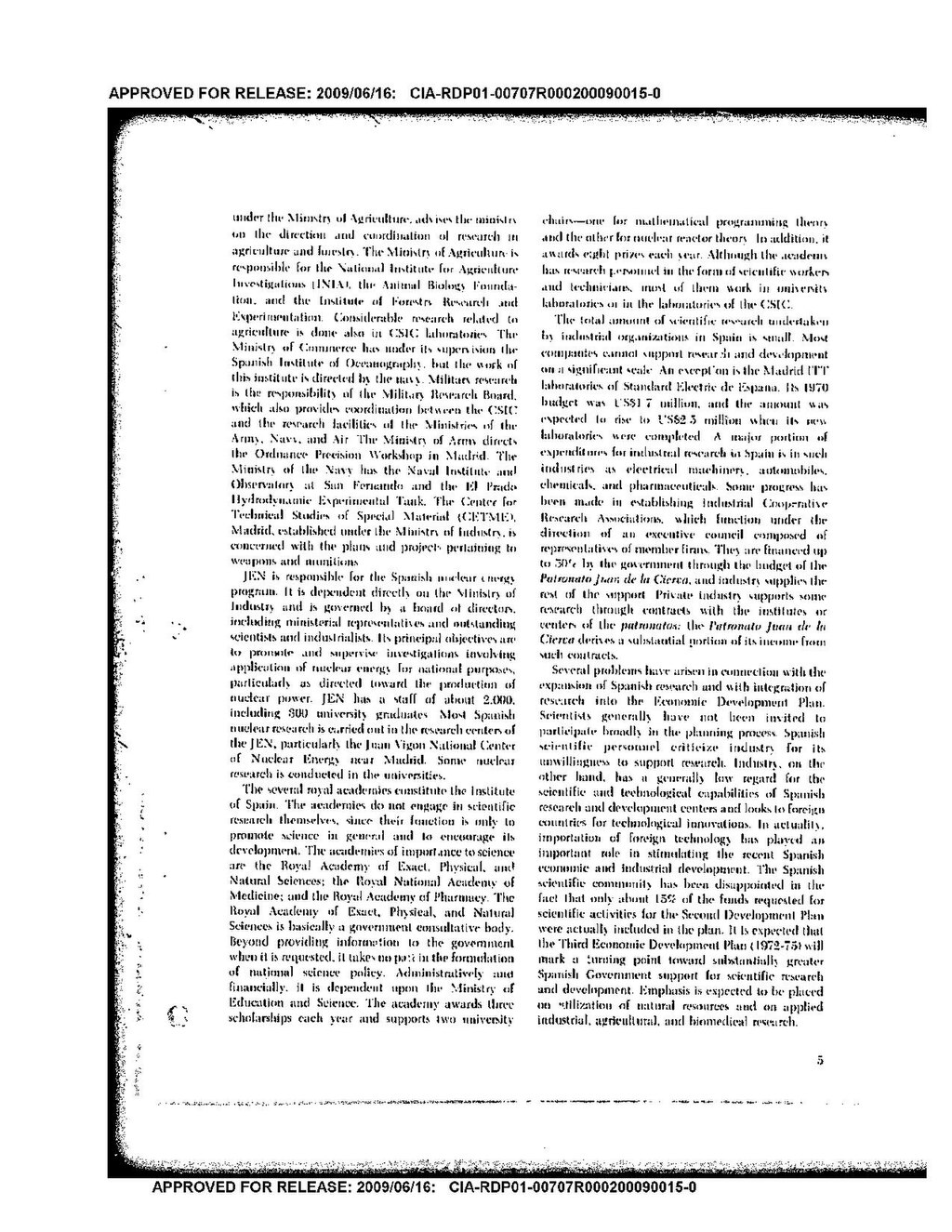APPROVED FOR RELEASE: 2009/06/16: CIA-RDP01-00707R000200090015-0
under the Ministry of Agriculture, advises the ministry on the direction and coordination of research in agriculture and forestry. The Ministry of Agriculture is responsible for the National Institute for Agriculture Investigations (INIA), the Animal Biology Foundation, and the Institute of Forestry Research and Experimentation. Considerable research related to agriculture is done also in CSIC laboratories. The Ministry of Commerce has under its supervision the Spanish Institute of Oceanography, but the work of this institute is directed by the navy. Military research is the responsibility of the Military Research Boards, which also provides coordination between the CSIC and the research facilities of the Ministries of the Army, Navy, and Air. The Ministry of Army directs the Ordnance Precision Workshop in Madrid. The Ministry of the Navy has the Naval Institute and Observatory at San Fernando and the El Prado Hydrodynamic Experimental Tank. The Center for Technical Studies of Special Material (CETME), Madrid, established under the Ministry of Industry, is concerned with the plans and projects pertaining to weapons and munitions.
JEN is responsible for the Spanish nuclear energy program. It is dependent directly on the Ministry of Industry and is governed by a board of directors, including ministerial representatives and outstanding scientists and industrialists. Its principal objectives are to promote and supervise investigations involving application of nuclear energy for national purposes, particularly as directed toward the production of nuclear power. JEN has a staff of about 2,000, including 300 university graduates. Most Spanish nuclear research is carried out in the research centers of the JEN, particularly the Juan Vigon National Center of Nuclear Energy near Madrid. Some nuclear research is conducted in the universities.
The several royal academies constitute the Institute of Spain. The academies do not engage in scientific research themselves, since their function is only to promote science in general and to encourage its development. The academies of importance to science are the Royal Academy of Exact, Physical, and Natural Sciences; the Royal National Academy of Medicine; and the Royal Academy of Pharmacy. The Royal Academy of Exact, Physical, and Natural Sciences is basically a government consultative body. Beyond providing information to the government when it is requested, it takes no part in the formulation of national science policy. Administratively and financially, it is dependent upon the Ministry of Education and Science. The academy awards three scholarships each year and supports two university chairs - one for mathematical programming theory and the other for nuclear reactor theory. In addition, it awards eight prizes each year. Although the academy has research personnel in the form of scientific workers and technicians, most of them work in university laboratories or in the laboratories of the CSIC.
The total amount of scientific research undertaken by industrial organization in Spain is small. Most companies cannot support research and development on a significant scale. An exception is the Madrid ITT laboratories of Standard Electric de Espana. Its 1970 budget was US$1.7 million, and the amount was expected to rise to US$2.5 million when its new laboratories were completed. A major portion of expenditures for industrial research in Spain is in such industries as electrical machinery, automobiles, chemicals, and pharmaceuticals. Some progress has been made in establishing Industrial Cooperative Research Associations, which function under the direction of an executive council composed of representatives of member firms. They are financed up to 50% by the government through the budget of the Patronato Juan de la Cierva, and industry supplies the rest of the support. Private industry supports some research through contracts with the institutes or centers of the patronatos; the Patronato Juan de la Cierva derives a substantial portion of its income from such contracts.
Several problems have arisen in connection with the expansion of Spanish research and with integration of research into the Economic Development Plan. Scientists generally have not been invited to participate broadly in the planning process. Spanish scientific personnel criticize industry for its unwillingness to support research. Industry, on the other hand, has a generally low regard for the scientific and technological capabilities of Spanish research and development centers and looks to foreign countries for technological innovations. In actuality, importation of foreign technology has played an important role in stimulating the recent Spanish economic and industrial development. The Spanish scientific community has been disappointed in the fact that only about 15% of the funds requested for scientific activities for the Second Development Plan were actually included in the plan. It is expected that the Third Economic Development Plan (1972-1975) will mark a turning point toward substantially greater Spanish Government support for scientific research and development. Emphasis is expected to be placed on utilization of natural resources and on applied industrial, agricultural, and biomedical research.
5
APPROVED FOR RELEASE: 2009/06/16: CIA-RDP01-00707R000200090015-0
